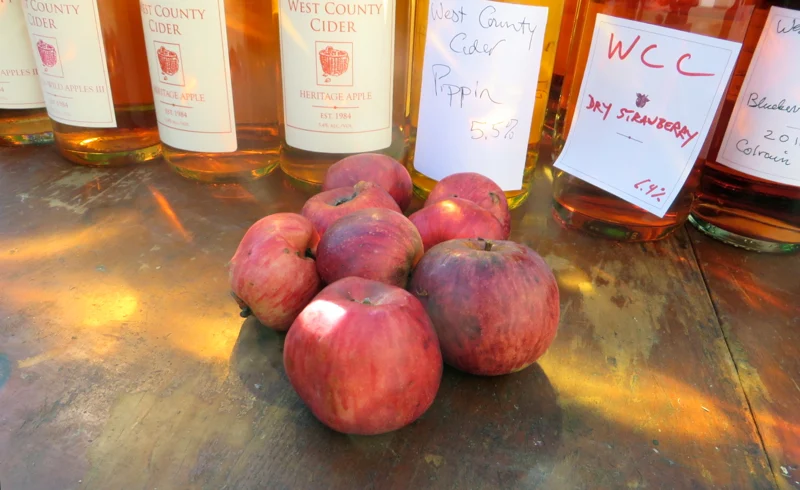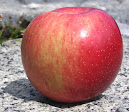 |
Beware any apple called Bitter. It will not be good to eat.
The virtues of Tremlett's Bitter live in cider, not eating. But cider apples are interesting. They may be spitters but their potent flavors show the heights and depths this fruit can reach.
I have three of these small apples, gnarly and fragrant. One is particularly knobby and ribbed, but on all the blush is a streaky red so dark that some vertical smears run nearly black, hinting at tannic riches. The underlying peel is probably yellow.
They are round and oblate with tiny clenched calyxes in the base. The peel ranges from matte to semigloss.
Anyway, here goes, spitkerchief at the ready.
Despite a very firm feel in hand, the flesh is yielding and granular, a fine-grained off white.
Tremlett's is mostly palatable, with surprisingly mild flavors, but every bite is laced with a small measure of an extreme, bitterness that is almost chemical.
That bitter bite is present in the flesh but concentrated in the peel. The flesh is on the dry side.
Leaving the peel out of the equation, the apple is well balanced, actually on the sweet side with little acidity. There is vanilla and mellon or a similar succulent fruity flavor. I feel that these are playing hide and seek with me in and about the bitter notes.
Tremlett's leaves an appropriately dry finish.
"West Country Pippin" is the name of the cider made from these apples. I did not take notes when I tasted the cider, but found it dry and complex and interesting.
 |
| A bevy of Tremlett's before bottles of backlit cider, including West Country Pippin. |
For a Thanksgiving tipple, however, I walked off with a heritage blend I judged to be more generally accessible to family members.
Tremlett's Bitter belongs to a class of apples that provide the bitter tannins really good hard cider needs.
Orange Pippin notes, "Many growers and nurseries in the USA have taken scionwood from a Tremlett's Bitter tree held at the USDA repository at Geneva, NY." However, "this tree was mis-cataloged, and is not the English variety."
 |
Fedco speculates that "It may well be that no one in the States has the true Tremlett’s."
Based on that, I have taken the liberty of classifying these as the Geneva variety, though I do not have the true English breed to compare.
In any case, the aroma of these little apples is really delightful: cidery and a little flowery and complex. Somebody ought to bottle the stuff.

As a chemist, I object to you calling the bitterness "almost chemical," but otherwise, a fine and intriguing review.
ReplyDeleteOo! I guess that is a valid criticism, Mike. I certainly was not using the adjective in any scientific sense.
DeleteI'll just say that there are some flavors, at some intensities, that seem to say, This is not food.